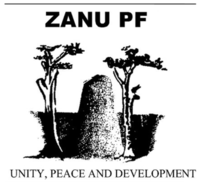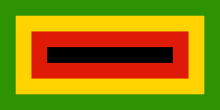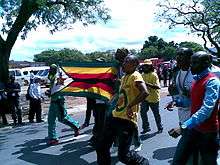ZANU–PF
Zimbabwe African National Union – Patriotic Front | |
|---|---|
 | |
| Abbreviation | ZANU–PF |
| First Secretary and President | Emmerson Mnangagwa |
| Second co-secretaries and Vice Presidents |
Constantino Chiwenga Kembo Mohadi |
| National Chairperson | Simon Khaya-Moyo |
| Secretary General | Obert Mpofu |
| Founder(s) |
Robert Mugabe Joshua Nkomo |
| Founded | 22 December 1987 |
| Merger of | ZANU, ZAPU |
| Headquarters | ZANU–PF Building |
| Ideology |
Left-wing populism[1] National liberation[2] Anti-imperialism[3] Pan-Africanism[3] |
| Political position | Left-wing |
| Regional affiliation | Former Liberation Movements of Southern Africa |
| International affiliation | None |
| Colours |
Green, yellow, red, black |
| House of Assembly |
179 / 270 |
| Senate |
34 / 80 |
| Party flag | |
 | |
| Website | |
|
www | |
The Zimbabwe African National Union – Patriotic Front (ZANU–PF) has been the ruling party in Zimbabwe since independence in 1980. The party was led for many years under Robert Mugabe, first as Prime Minister with the Zimbabwe African National Union (ZANU) and then as President from 1987 after the merger with the Zimbabwe African People's Union (ZAPU) and retaining the name ZANU–PF, until 2017 when he was removed as leader.
At the 2008 parliamentary election, the ZANU–PF lost sole control of parliament for the first time in party history and brokered a difficult power-sharing deal with the Movement for Democratic Change – Tsvangirai (MDC), but subsequently won the 2013 election and gained a two-thirds majority.
On 19 November 2017, ZANU-PF sacked Robert Mugabe as party leader, who resigned two days later, and appointed former Vice President Emmerson Mnangagwa in his place.[4]
History
Founding
ZANU was founded by Ndabaningi Sithole, Henry Hamadziripi, Mukudzei Midzi, Herbert Chitepo, Edgar Tekere, and Leopold Takawira at the house of former Defence Minister Enos Nkala in Highfield in August 1963.[5]
The Patriotic Front (PF) was formed as a political and military alliance between ZAPU and ZANU during the war against white minority rule in Rhodesia (now called Zimbabwe). The PF included the Soviet Union-backed ZAPU, which was led by Joshua Nkomo and operated mainly from Zambia, and the Chinese-backed ZANU led by Robert Mugabe, which operated mainly from neighbouring Mozambique. Both movements contributed to their respective military forces. ZAPU's military wing was known as the Zimbabwe People's Revolutionary Army (ZIPRA) and ZANU's guerrillas were known as the Zimbabwe African National Liberation Army. The objective of the PF was to overthrow the predominantly white minority government, headed by the Prime Minister Ian Smith, through political pressure and military force.[6]
Their common goal was achieved in 1980, following the Lancaster House Agreement of December 1979, when the United Kingdom granted independence to Zimbabwe following a brief period of direct British control. During the 1980 general election campaign, the PF parties competed separately as ZANU–Patriotic Front (ZANU–PF) and Patriotic Front–ZAPU (PF–ZAPU). The election was won by Mugabe and ZANU–PF, with Nkomo and his PF–ZAPU retaining a stronghold in the provinces of Matabeleland.[6]
In December 1981, agents of South Africa's apartheid government bombed party headquarters, nearly killing many senior ZANU–PF leaders, including Robert Mugabe.[7]
In December 1987, after five years of the low-level civil war known as Gukurahundi, the opposition ZAPU, led by Nkomo, was absorbed through the Unity Accord with ZANU to form an official ZANU–PF.[8]
Recent electoral performance
From 1999-2017, Mugabe faced a major political challenge from the opposition Movement for Democratic Change. Mugabe won 56% at the presidential elections of 9–11 March 2002.
At the December 2004 five-year conference, Joice Mujuru, a Zezuru Shona like Mugabe, and whose late-husband Solomon Mujuru was the retired head of the armed forces, was elevated to the post of Vice President of the party (the first woman to hold that office) at the expense of contender Emmerson Mnangagwa and his supporters; Justice Minister Patrick Chinamasa and Information Minister Jonathan Moyo.[9]
The 2005 Zimbabwe parliamentary elections were held on 31 March 2005. The party won 59.6% of the popular vote and 78 out of 120 elected seats. Later that year, 26 November, it won 43 of 50 elected senators. The parliamentary election was disputed as being unfair. The leader of the opposition MDC party said, "We are deeply disturbed by the fraudulent activities we have unearthed", and various human rights groups reported that hundreds of thousands of "ghost voters" had appeared on the electoral roll of 5.8 million people.[10]
At the 2008 parliamentary election, the ZANU–PF lost its majority in parliament for the first time since independence, and held 94 seats out of the expanded 210 seats, with Sokwanele stating that this figure would have been lower had it not been for gerrymandering, electoral fraud, and widespread intimidation.[11]
At the 2008 presidential election, Morgan Tsvangirai, the MDC candidate, received the most votes, but did not gain an absolute majority; thus a runoff was necessary. Initial results led to MDC-T claiming the required majority. However, ballots were recounted at a National Command Centre over a period of over a month without the presence of independent observers. The election process that followed was marred by more violence against and intimidation of voters and party workers. Morgan Tsvangirai initially stated he intended to contest the second round but pulled out of the runoff saying a free and fair election was impossible in the current climate. The elections were held on 27 June with a single candidate, Robert Mugabe, who was re-elected.
Many blame ZANU–PF for neglecting to deal with Zimbabwe's problem with the mounting 2008 Zimbabwean cholera outbreak, which by the start of December 2008 had already killed between 500 and 3,000 people.[12]
Former President of South Africa Thabo Mbeki facilitated, under the auspices of Southern African Development Community (SADC), a Zimbabwean Government of Power-Sharing between ZANU–PF, the Movement for Democratic Change – Tsvangirai and the Movement for Democratic Change – Mutambara.
Split of re-organised ZAPU

In November 2008, a group of former ZAPU members, most of them hailing from Bulawayo in Matabeleland, left ZANU–PF and re-established the ZAPU party stating five motives:
- Former ZAPU members and Ndebele being left out in the discussions between the two Movement for Democratic Change formations and ZANU–PF.
- Unhappiness with the sacking of Dumiso Dabengwa from the Politburo because he supported Simba Makoni at the 2008 presidential election.
- Lack of development in Bulawayo province, including the lack of progress on the Matabeleland Zambezi Water Project.
- Former ZIPRA personnel not considered for burial at Heroes' Acre;
- The issue of succession.[13]
Post-Mugabe transition
In 2014, a battle between Vice President Joice Mujuru and Justice Minister Emmerson Mnangagwa, and possibly First Lady Grace Mugabe, began over the succession to President Robert Mugabe. An elective congress was scheduled for December 2014, in which ZANU–PF would elect members to fill vacancies in the central committee, politburo, and presidium, and most likely endorse the party's next candidate for president. This congress, which takes place every five years, is the most important elective organ for the party.
Although President Mugabe had not named a successor, Joice Mujuru was seen by many as the most likely candidate. She had support from both the politburo and the population at large (demonstrated by the election of her loyalists to the youth league).[14] Minister Emmerson Mnangagwa was supported by a smaller group composed mainly of senior members of the security establishment, part of ZANU–PF's parliamentary caucus, younger party members, and a few influential parts of the Zimbabwean business community. He had been with Mugabe since Zimbabwe gained independence and was regarded by many as a successor who could maintain stability after Mugabe eventually left office.[15]
Mujuru lost the succession battle with Mnangagwa after being expelled from the party in 2015[16] a new power struggle began between Mnangagwa's faction (known as Team Lacoste) and Grace Mugabe's faction (known as Generation 40 or G40) which had become violent by 2017.[17] Emmerson Mnangagwa was demoted from Minister of Justice following a cabinet reshuffle, soon after he publicly claimed that he was poisoned, in early-October 2017. On 15 November 2017, a military coup in Zimbabwe resulted in President Robert Mugabe being placed under house arrest and led to speculation over whether Grace Mugabe or Emmerson Mnangagwa would succeed him as leader of the party. Following the 2017 Zimbabwe coup, ZANU-PF voted to depose Robert Mugabe as party leader and install the banished Emmerson Mnangagwa as leader instead. Before the Zimbabwean parliament could vote to impeach Mugabe, he resigned from the presidency on 21 November 2017.[18] Mnangagwa was sworn in as the new President of the Republic of Zimbabwe on 24 November 2017.[19]
Ideology
Officially, ZANU–PF has a socially democratic ideology. The party maintains a Politburo and a Central Committee.[20] However, the party's ideology may be changing as Mnangagwa said that "all foreign investments will be safe in Zimbabwe" and calls for "increased production and capacity and new investment in the country."[21][22]
Land redistribution
Mugabe pursued a more left-wing populist policy on the issue of land redistribution in 2000s, encouraging seizure of commercial farms—usually owned by Zimbabwe's white minority—"for the benefit of landless black peasants."[23] The inauguration speech of President Mnangagwa threw this program's support into question since he said that the "government is committed to work on a compensation plan for former land owners."[21] The compulsory acquisition of commercial farmland without compensation was discontinued in early 2018.[24]
International relations
ZANU–PF is a member of the Former Liberation Movements of Southern Africa, an association of six political parties that were involved in the nationalist and anti-colonialist movements of Southern Africa, with roots in the Frontline States. ZANU–PF was previously affiliated with Socialist International (SI), having sent representatives with guest status to the SI Congress in 1980,[25] 1992,[26] and 1996,[27] and was present at the Socialist International Africa Committee meeting in Maputo, Mozambique, as recently as 1999.[28] ZANU–PF has not attended any SI congresses or meetings since, and the party's opposition, the Movement for Democratic Change – Tsvangirai, in fact joined SI in 2008. Socialist International has condemned the actions of Zimbabwe's ZANU–PF-dominated government and military.[29]
Electoral results
Presidential elections
| Year | Candidate | First Round | Second Round | Result | ||
|---|---|---|---|---|---|---|
| Popular Vote | Percentage | Popular Vote | Percentage | |||
| 1990 | Robert Mugabe | 2,026,976 | 83.1 | Won | ||
| 1996 | Robert Mugabe | 1,404,501 | 92.8 | Won | ||
| 2002 | Robert Mugabe | 1,685,212 | 56.2 | Won | ||
| 2008 | Robert Mugabe | 1,079,730 | 43.2 | 2,150,269 | 85.5 | Won |
| 2013 | Robert Mugabe | 2,110,434 | 61.1 | Won | ||
| 2018 | Emmerson Mnangagwa | 2,460,463 | 50.8 | Won | ||
Parliamentary elections
| Year | Popular Vote | Percentage | Seats | Government |
|---|---|---|---|---|
| 1980 | 1,668,992 | 63.0% (Common roll) | 57 / 100 |
ZANU |
| 1985 | 2,233,320 | 77.2% | 64 / 100 |
ZANU–PF |
| 1990 | 1,690,071 | 80.5% | 117 / 120 |
ZANU–PF |
| 1995 | 1,143,349 | 81.4% | 118 / 120 |
ZANU–PF |
| 2000 | 1,211,284 | 48.6% | 62 / 120 |
ZANU–PF |
| 2005 | 1,569,867 | 59.6% | 78 / 120 |
ZANU–PF |
| 2008 | 1,110,649 | 45.9% | 99 / 210 |
MDC–T–ZANU–PF |
| 2013 | 2,116,116 | 62.4% | 196 / 270 |
ZANU–PF |
| 2018 | 2,477,708 | 52.3% | 179 / 270 |
ZANU–PF |
Congress
- 1st National People's Congress (December 1990)
- 2nd National People's Congress (December 1995)
- 3rd National People's Congress (December 2000)
- 4th National People's Congress (December 2004)
- 5th National People's Congress (December 2009)
- 6th National People's Congress (December 2014)
- 7th National People's Congress (12–17 December 2017)
References
- ↑ Drinkwater, Michael (1991). The State and Agrarian Change in Zimbabwe's Communal Areas. Basingstoke: Palgrave-Macmillan. pp. 93–96. ISBN 978-0312053505.
- ↑ Speech By The First Secretary at the ZANU PF EXTRA ORDINARY CONGRESS, accessed Jan 14, 2018.
- 1 2 "What is ZANU-PF". ZANU-PF. Retrieved 9 June 2018.
- ↑ Breaking News -President Mugabe resigns!, accessed Jan 14, 2018.
- ↑ Sibanda, Eliakim (2005). The Zimbabwe African People's Union 1961–87: A Political History of Insurgency in Southern Rhodesia. Africa World Press. p. 321. ISBN 1-59221-275-1.
- 1 2 Martin, D & Johnson, P. (1981). The Struggle for Zimbabwe. Faber & Faber. p. 400.
- ↑ Karekwaivanane, George Hamandishe (2017-11-30). The Struggle over State Power in Zimbabwe: Law and Politics since 1950. Cambridge University Press. p. 192. ISBN 9781108117692.
- ↑ ""Zimbabwean political flags" at FOTW".
- ↑ "Mutasa blasts Mnangagwa". The Standard (Zimbabwe). 5 May 2013. Retrieved 23 May 2013.
- ↑ Mugabe's party sweeps to victory. BBC News.
- ↑ "Mugabe's Zanu-PF loses majority". BBC News. 3 April 2008.
- ↑ "Zimbabwe cholera death toll nears 500". CNN. 2 December 2008. Retrieved 2 December 2008.
- ↑ "Dabengwa speaks on Zapu's future, alliances". Bulawayo24 News. 17 January 2013. Retrieved 23 May 2013.
- ↑ "We must all resign in December, says Mugabe". NewsdzeZimbabwe. 18 August 2014. Retrieved 9 October 2014.
- ↑ "Zimbabwe waiing for the future" (PDF). www.crisisgroup.org. 29 September 2014. Retrieved 9 October 2014.
- ↑ "Zimbabwe ruling party expels Mugabe rival Joyce Mujuru". Bbc.com. 3 April 2015.
- ↑ Jeffrey Muvundusi and Tendai Kamhungira (23 May 2017). "Mugabe's Zanu PF brawls: Wheels come off". Zimbabwe Situation. DailyNews Live. Retrieved 24 May 2017.
- ↑ "Ruling party sacks Mugabe as leader". BBC News. Retrieved 19 November 2017.
- ↑ Cde ED Mnangagwa Sworn in as the new President of the Republic of Zimbabwe, accessed Jan 14, 2018.
- ↑ "Zanu-PF official site". Zanupf.org.zw. Retrieved 27 November 2017.
- 1 2 President E.D Mnangagwa Inauguration Speech, Accessed Jan 14, 2018.
- ↑ POLITBURO MEETING HELD ON THE 10TH OF JANUARY 2018.
- ↑ "Breaking News, Analysis, Politics, Blogs, News Photos, Video, Tech Reviews". TIME.com. 1 May 2000. Retrieved 27 November 2017.
- ↑ "Mugabe's land reform costs Zimbabwe $17 billion: economists". News 24. Cape Town. 12 May 2018. Retrieved 14 June 2018.
- ↑ "Socialist International Congress, 1980" (PDF). Socialist Affairs: 27. 1981.
- ↑ "XIX Congress of the Socialist International, Berlin" (PDF). Socialist Affairs: 49. 1992.
- ↑ "The XX Congress" (PDF). Socialist Affairs: 64. 1996.
- ↑ "Meeting of the Socialist International Africa Committee, Maputo, Mozambique". Socialist International. September 1999. Retrieved 2018-10-14.
- ↑ Tengely-Evans, Tomáš (2017-11-15). "Zimbabwean socialist responds to 'palace coup' facing Mugabe's regime". Socialist Worker. Retrieved 2018-10-14.